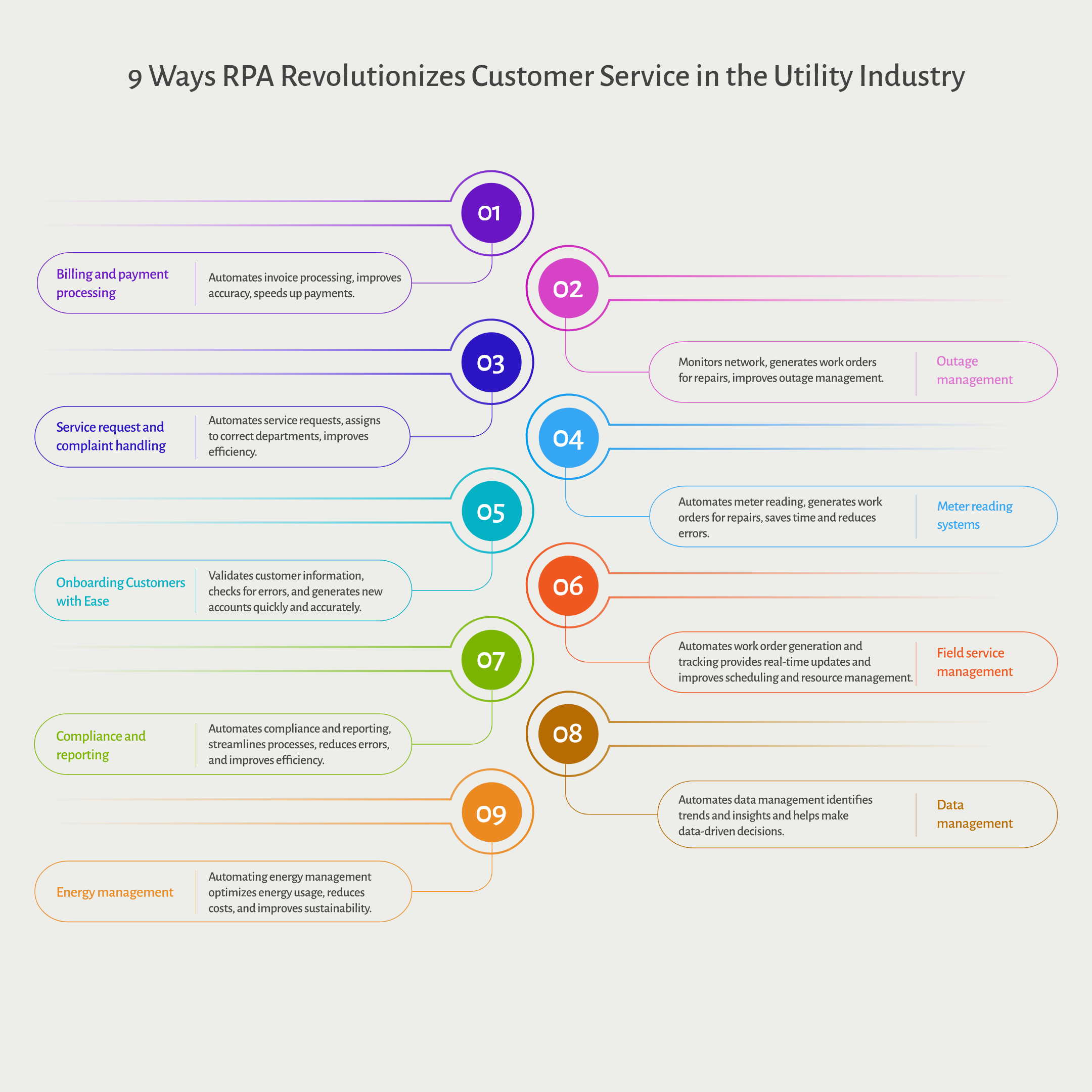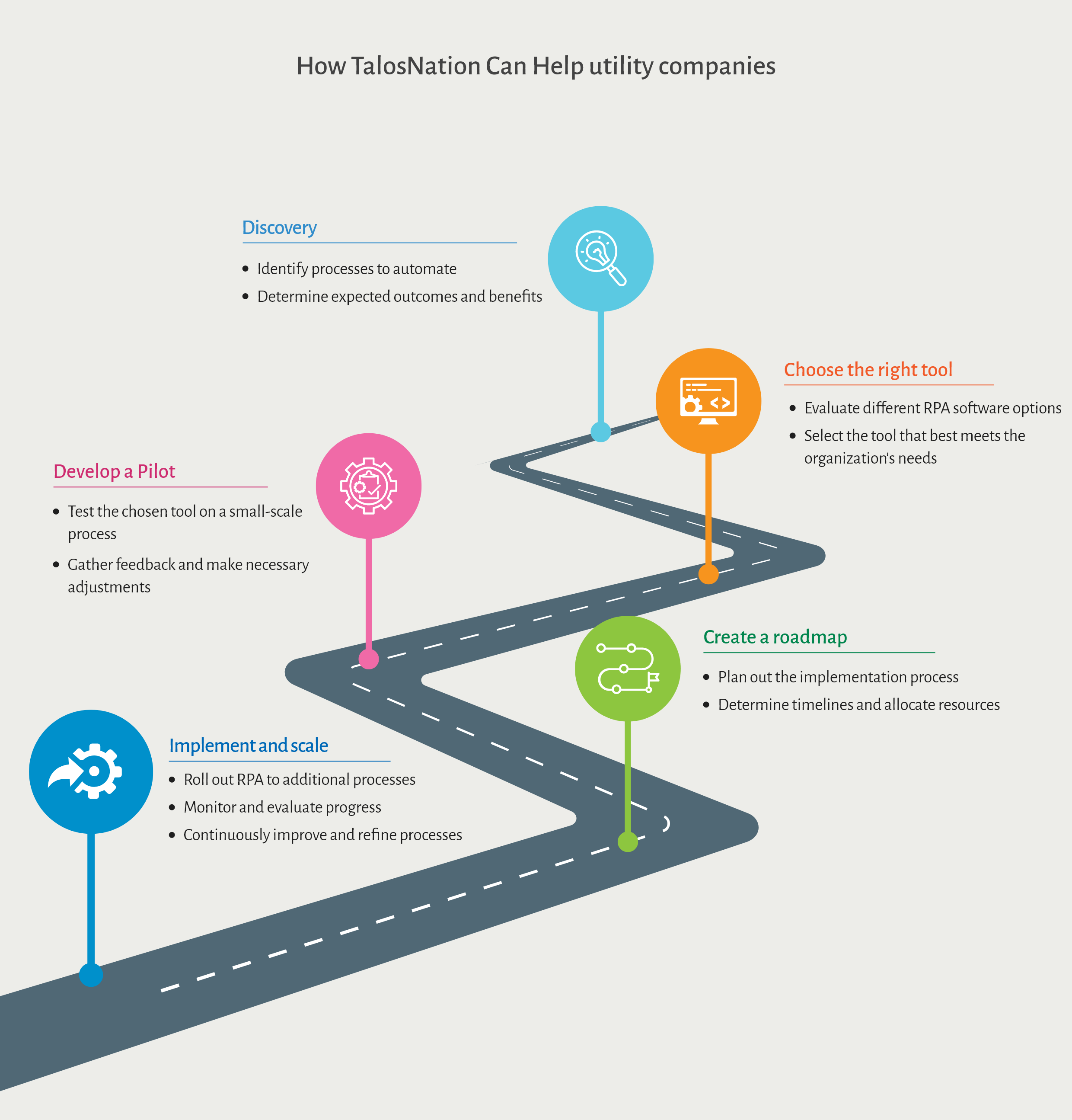Talosnation
Attention utilities industry professionals! Are you looking for a way to take your customer service to the next level? Look no further than TalosNation's Robotic Process Automation (RPA). Streamline your utility company's operations and enhance customer satisfaction by leveraging TalosNation's RPA service. Automate invoicing, outage management, service requests, meter readings, work orders, call centers, payment processing, account administration, and client onboarding. Additionally, improve customer experience with complaint handling and service request automation, boost efficiency with work order and meter reading systems, enhance field service management, streamline compliance and reporting, improve data management with RPA analytics, improve energy efficiency with RPA energy management solutions, and set up new accounts with ease using RPA. Our AI-powered RPA automation solutions can help you reduce response times and free up your team to focus on higher-level tasks. Let's explore how TalosNation's RPA service can revolutionize your customer service operations!
So, What is RPA and How Does it Work?

Robotic Process Automation (RPA) refers to the use of software robots or digital assistants to automate repetitive and rule-based tasks. These robots can mimic human actions such as logging into applications, copying and pasting data, and even making decisions based on predefined rules. RPA technology has revolutionized the way organizations conduct their business processes, particularly in industries like utilities, where there are many manual and time-consuming tasks involved in customer service operations. By automating these tasks, RPA can help improve accuracy, speed, and efficiency while freeing up human resources to focus on more critical tasks.
And what are the Benefits of Implementing RPA in the Utilities Industry?

The implementation of RPA in the utility industry can bring significant benefits to companies. By automating repetitive and time-consuming tasks, RPA allows employees to focus on more complex and strategic work. Here are some of the key benefits of implementing RPA in the utility industry:
- Increased efficiency: RPA can significantly increase efficiency by automating routine tasks such as data entry, billing, and payment processing. This reduces the risk of errors, saves time, and increases productivity.
- Cost savings: By automating processes, companies can save on labor costs and improve their bottom line. Additionally, RPA can reduce operational costs by minimizing the need for manual interventions and improving process accuracy.
- Improved accuracy: RPA is highly accurate and can eliminate human errors that are common in manual processes. This can help companies to provide better service to their customers and avoid costly mistakes.
- Enhanced customer experience: With RPA, companies can improve their response times to customer queries, reduce wait times, and provide faster and more accurate solutions to problems. This can lead to higher customer satisfaction and loyalty.
- Increased compliance: RPA can help utility companies comply with regulatory requirements and standards by ensuring that processes are performed accurately and consistently.
Overall, implementing RPA in the utility industry can help companies streamline processes, reduce costs, improve accuracy, enhance customer experience, and increase compliance. By leveraging TalosNation's AI-powered RPA service, companies can easily achieve these benefits and gain a competitive advantage in the industry.
Let’s look at 9 common Use Cases for RPA in Utilities Customer Service

- How RPA Service Can Streamline Billing and Payment Processing
Billing and payment processing can be time-consuming and error-prone, leading to delays and customer dissatisfaction. RPA technology can automate the process by retrieving and extracting data from invoices, validating the information, and processing payments. TalosNation's RPA service can improve accuracy, speed up the process, and reduce manual errors.
- Enhancing Outage Management with RPA Automation
- Utility companies must manage outages quickly and efficiently to minimize disruption to customers. RPA technology can help by monitoring network systems and identifying potential issues before they become major problems.
-If it identifies any issues, the RPA system can also automatically generate work orders for repairs and assign them to the respective personnel, reducing the response time and improving outage management. TalosNation's RPA automation can help utility companies respond to outages more quickly and effectively.
- Improving Customer Satisfaction with RPA Service Request and Complaint Handling Automation
Managing service requests and complaints can be quite a challenge for utility companies, but TalosNation's RPA solutions can help streamline the process. RPA solutions can receive and process customer service requests, assign them to the appropriate department, track their status, and even monitor and sort incoming complaints. By combining RPA with AI tools like sentiment analysis, utility companies can efficiently manage their customers' queries and complaints, resulting in quicker resolutions and happier customers.
- Boosting Efficiency with RPA Automated Meter Reading Systems
Utility companies rely on accurate meter readings to bill their customers and ensure they are providing the correct level of service. However, manually reading meters can be time-consuming and prone to errors. RPA technology can automate the process by automatically reading meters and generating invoices for the respective customers. TalosNation's RPA service can help utility companies streamline their meter reading processes, saving time and reducing errors.
- Simplifying Customer Onboarding with RPA Technology
Acquiring new customers and onboarding them can be a complex process, but TalosNation's RPA technology can help simplify it. The RPA system can validate customer information, check for errors, and generate new accounts quickly and accurately, providing a seamless experience for both customers and utility companies. This can speed up the account opening process by reducing errors and checking all rules that have to match for the account to be successfully opened. If there is any issue, the software flags it for an employee to resolve. With TalosNation's RPA service, utility companies can onboard customers with ease and accuracy, freeing up employees to focus on more complex tasks.
- Improving Field Service Management with RPA Automation
Field service management is a critical function for utility companies, as it involves sending technicians to repair or maintain equipment in the field. RPA technology can automate the process by generating work orders, dispatching technicians, and tracking their progress. It can also provide real-time updates on equipment status and repair progress, allowing for more efficient scheduling and management of resources. TalosNation's RPA automation can help utility companies optimize their field service operations, reducing costs and improving customer satisfaction.
- Streamlining Compliance and Reporting with RPA Solutions
Compliance and reporting are essential for utility companies to ensure they are meeting regulatory requirements and reporting accurate data. However, these processes can be time-consuming and complex, requiring significant resources. RPA technology can automate compliance and reporting processes by extracting data from various sources, validating the information, and generating reports. TalosNation's RPA solutions can help utility companies streamline their compliance and reporting processes, reducing errors and improving efficiency.
- Enhancing Data Management with RPA Analytics
Data management is crucial for utility companies to maintain accurate records, track usage, and identify trends. RPA technology can automate data management processes by extracting data from various sources, validating it, and analyzing it to identify trends and provide insights to stakeholders. TalosNation's RPA analytics can help utility companies make data-driven decisions and improve their operations, resulting in a better customer experience and increased efficiency.
- Improving Energy Efficiency with RPA Energy Management Solutions
Energy efficiency is a top priority for utility companies, as it can help reduce costs and improve sustainability. RPA technology can automate energy management processes by analyzing energy usage data, identifying areas of inefficiency, and generating recommendations for improvement. TalosNation's RPA energy management solutions can help utility companies optimize their energy usage, reducing costs and improving sustainability.
To sum it up, RPA has become an essential tool for the utility industry, and TalosNation's RPA solution can help utility companies optimize their operations, improve their bottom line, and stay ahead of the competition. From billing and payment processing to outage management and field service management, TalosNation's RPA automation can automate processes, streamline operations, and provide better customer experiences. With the addition of compliance and reporting, data management, and energy management, TalosNation can provide a comprehensive suite of RPA services to help utility companies navigate the challenges of the industry. By leveraging the power of RPA and other digital technologies, utility companies can transform their operations and provide more efficient, reliable, and cost-effective services to their customers.
How TalosNation Can Help utility companies?

TalosNation's RPA experts have extensive experience in helping companies identify the best processes for automation and tailoring RPA technologies to their specific needs. They work closely with their clients to analyze their operations, understand their pain points, and identify areas where automation can bring the most significant benefits.
Through this analysis, TalosNation's RPA experts can recommend the most appropriate RPA technologies and tools for each client's unique needs. They take into account factors such as the complexity of the process, the volume of data involved, and the level of customization required.
Once the processes have been identified, TalosNation's RPA experts can work closely with their clients to design and implement an RPA solution that delivers maximum value. This includes configuring the RPA software to match the specific needs of the client's business, integrating it with existing systems, and providing training to staff to ensure a smooth transition to the new system.
TalosNation's approach ensures that each RPA solution is tailored to the unique needs of the utility company, providing maximum value and efficiency. By working with TalosNation's RPA experts, utility companies can automate their processes with confidence, knowing that they are getting the most appropriate technology for their business needs.
Finally, TalosNation's RPA experts bring a high level of expertise and experience to the utility industry, helping companies identify the best processes for automation and tailor RPA technologies to their specific needs. By working closely with their clients, they can design and implement an RPA solution that delivers maximum value, streamlines operations, and enhances customer experiences. With TalosNation's RPA solutions, utility companies can stay ahead of the competition and navigate the challenges of the industry with ease.
Getting Started with RPA Implementation: Key Considerations

Once you have identified the processes that can benefit from RPA, it's time to start the implementation process. Here are some key considerations to keep in mind:
- Choose the right RPA solution: As mentioned earlier, not all RPA solutions are created equal. It's essential to choose an RPA solution that can address your specific needs and challenges. TalosNation's RPA experts can help you analyze your processes and tailor the RPA technology to your needs.
- Set clear goals and expectations: Before starting the implementation process, it's important to define clear goals and expectations. What do you want to achieve with RPA? How will you measure success? Setting clear goals and expectations will help you stay on track and measure the impact of RPA on your business.
- Involve all stakeholders: RPA implementation involves not only the IT department but also other stakeholders, such as business users, process owners, and compliance officers. It's important to involve all stakeholders in the process to ensure that everyone is on board and understands the benefits and impact of RPA.
- Prioritize processes for automation: Not all processes are suitable for automation. It's important to prioritize processes based on their complexity, frequency, and potential impact on the business. TalosNation's RPA experts can help you identify the processes that can benefit most from automation.
- Prepare for change management: RPA implementation can bring significant changes to the way work is done in your organization. It's essential to prepare for change management and involve employees in the process. This will help them understand the benefits of RPA and embrace the new way of working.
- Monitor and measure performance: Once RPA is implemented, it's important to monitor and measure its performance continuously. This will help you identify any issues or areas for improvement and ensure that RPA is delivering the expected benefits.
In conclusion, implementing RPA in the utility industry can be a game changer, but it requires careful planning and execution. By choosing the right RPA solution, setting clear goals and expectations, involving all stakeholders, prioritizing processes, preparing for change management, and monitoring performance, you can ensure a successful RPA implementation that delivers significant benefits to your business. TalosNation's RPA experts can help you at every step of the way, from analyzing your processes to implementing and optimizing RPA technology tailored to your needs.
Overcoming Potential Challenges of RPA Implementation

While RPA implementation can provide significant benefits to utility companies, it's important to be aware of potential challenges that may arise. Here are some common challenges and strategies for overcoming them:
- Resistance to change: Employees may be resistant to new technology and workflows. It's important to communicate the benefits of RPA and involve employees in the implementation process.
- Integration with legacy systems: RPA implementation may require integration with existing legacy systems. It's important to choose an RPA solution that can integrate with a wide range of systems and to involve IT in the implementation process.
- Scalability: As RPA implementation expands, it's important to ensure that the infrastructure and resources can handle the increased volume. It's important to plan for scalability from the beginning and to involve stakeholders in the process.
- Security concerns: RPA implementation may raise security concerns, particularly if it involves sensitive data. It's important to choose an RPA solution that has robust security features and to involve security teams in the implementation process.
By being aware of these potential challenges and proactively addressing them, utility companies can successfully implement RPA and realize the benefits of improved efficiency, accuracy, and customer experience.
Future Trends and Innovations in RPA for Utilities Customer Service

The use of RPA in the utility industry is constantly evolving, and new trends and innovations are emerging. One area of focus for the future is the use of artificial intelligence (AI) and machine learning (ML) to enhance RPA capabilities. This includes the development of chatbots and virtual assistants that can provide personalized customer service and support. Additionally, the integration of RPA with other emerging technologies like blockchain and the Internet of Things (IoT) is expected to create new opportunities for automation and optimization in the utility industry. As the industry continues to embrace digital transformation, we can expect to see continued growth and innovation in the field of RPA for utility customer service.
Ultimately, TalosNation's RPA solutions offer a game-changing opportunity for utility companies seeking to enhance their operations, streamline processes, and improve customer experiences. By collaborating with TalosNation's RPA experts, companies can identify the processes that can benefit the most from automation and tailor the RPA technology to their unique needs. Additionally, setting clear goals and expectations, involving all stakeholders, prioritizing processes, preparing for change management, and monitoring performance are essential factors to ensure a successful RPA implementation that delivers significant benefits to the business. Despite the potential challenges such as resistance to change, integration with legacy systems, scalability, and security concerns, the utility industry can benefit from the constant evolution of RPA and emerging trends such as AI and ML. TalosNation's RPA solutions offer a customized and secure approach to utility companies seeking to stay ahead of the competition in the ever-evolving utilities industry.
If you're interested in learning more about TalosNation's RPA solutions for utility companies, we encourage you to contact us to schedule a consultation with one of our experts. We look forward to hearing from you!
